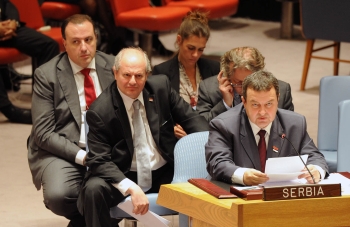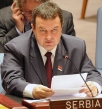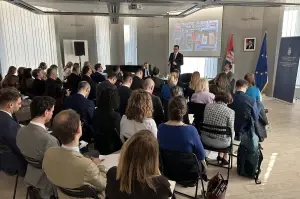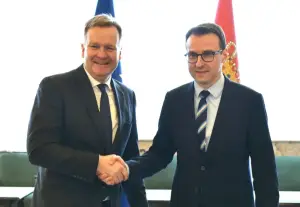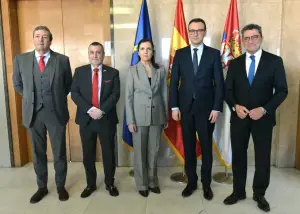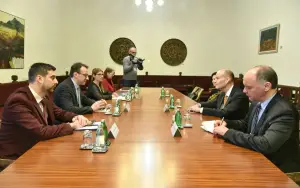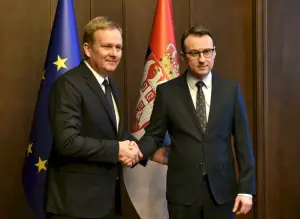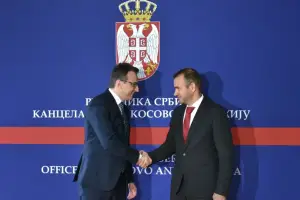Q:
A:
Serbia advocates finding sustainable solution for Kosovo-Metohija
Belgrade/New York,
14 June 2013
Prime Minister Ivica Dacic reiterated today in New York that Serbia is determined to implement the agreement reached in Brussels and that Serbia has high expectations of new meetings between teams in charge of the preparation of the plan for agreement implementation.
At a meeting of UN Security Council (UNSC) dedicated to the situation in Kosovo-Metohija, Dacic said that it is very important for Serbia that the talks on the agreement implementation are carried out in keeping with the will and intentions of the negotiating parties who drafted the Brussels agreement, so that the position of Serbs in Kosovo-Metohija is clearly defined.
Dacic said that it is clear that a historic progress was made in the Belgrade-Pristina relations between the two UNSC sessions, noting that Serbia expects the international community to encourage the agreement implementation and building regional stability at this historic moment.
Dacic said that he expects the support from UNSC member countries and the EU Council which should adopt the decision on opening Serbia's EU accession talks.
The Prime Minister said that he also encourages the Pristina government to continue the search for a compromise and common ground to the best interests of the people and their future.
Dacic underscored that the Brussels agreement is the first one of its kind which was reached between Belgrade and Pristina and the two sides are yet to conduct talks on a series of important matters, such as the status of the Serbian Orthodox Church, protection of religious and cultural sites, return of IDPs and property issues, as well as the modalities of agreement implementation.
Serbia is committed to the search for a sustainable solution to the Kosovo issue, along with preservation of territorial integrity and sovereignty, he said.
The Prime Minister added that it is of key importance for UNMIK troops to remain in the province in the same numbers as now, and for the cooperation with EULEX to be more efficient.
The same number of UNMIK troops is of vital importance for the efforts Serbia is investing to ensure efficient system of informing UN and the UNSC as the bodies that are irreplaceable in providing legitimacy to a comprehensive solution, he said.
Dacic said that the first agreement envisages that a community of municipalities with majority Serb population in Kosovo-Metohija should be set up which will have many important powers in economic development, education, healthcare and urban and rural planning.
Serbia will continue taking care of its people in Kosovo-Metohija and will do its best to ensure return and sustainable living for its citizens in the area, as it believes this is the best, although the most difficult, way to overcome the legacy of the past, he said.
Of all the institutions in Kosovo-Metohija, minority communities have most confidence in UNMIK and this is why the number of UNMIK members should not be reduced and should instead be reinforced because a sensitive period lies ahead in which the agreements on the important issues need to be implemented, he said.
Having granted limited legal and international subjectivity and legitimacy to Pristina interim institutions, Serbia believes that the talks on top political level should be carried out without entering the sphere of the international, state and legal status issues, he said.
This aims to set up authorities in the territory of the province that would be recognised by all sides involved in the process and also to provide strong legal and political guarantees on the level of the province and from the international community for political, territorial and other rights of national communities in the entire territory of the province, he said.
The existence of Serb population in the province, to the south and the north of the Ibar River alike, depends on their safety and security, Dacic underscored.
According to him, the security situation in the north of the province is still very fragile, and especially highlighted frequent incidents, given that in the first four months of this year there was a total of 60 ethnically motivated attacks, or 20 more against the same period in 2012 .
We especially point to the need to encourage the return which can only be done through creation of conditions for physical and economic sustainability of returnee communities in Kosovo-Metohija, Dacic said and added that the process has so far been very slow and hard to sustain.
Respect for human and minority rights, the protection of interests of life, cultural and religious heritage of all citizens, as well as full implementation of European standards in these areas remain the goal for we are committed to fight. We believe that only by insisting on these values the Balkans can resolve issues from its past, and use its multi-ethnicity as a valuable resource, rather than as a source of conflict, Dacic concluded.
Dacic said that it is clear that a historic progress was made in the Belgrade-Pristina relations between the two UNSC sessions, noting that Serbia expects the international community to encourage the agreement implementation and building regional stability at this historic moment.
Dacic said that he expects the support from UNSC member countries and the EU Council which should adopt the decision on opening Serbia's EU accession talks.
The Prime Minister said that he also encourages the Pristina government to continue the search for a compromise and common ground to the best interests of the people and their future.
Dacic underscored that the Brussels agreement is the first one of its kind which was reached between Belgrade and Pristina and the two sides are yet to conduct talks on a series of important matters, such as the status of the Serbian Orthodox Church, protection of religious and cultural sites, return of IDPs and property issues, as well as the modalities of agreement implementation.
Serbia is committed to the search for a sustainable solution to the Kosovo issue, along with preservation of territorial integrity and sovereignty, he said.
The Prime Minister added that it is of key importance for UNMIK troops to remain in the province in the same numbers as now, and for the cooperation with EULEX to be more efficient.
The same number of UNMIK troops is of vital importance for the efforts Serbia is investing to ensure efficient system of informing UN and the UNSC as the bodies that are irreplaceable in providing legitimacy to a comprehensive solution, he said.
Dacic said that the first agreement envisages that a community of municipalities with majority Serb population in Kosovo-Metohija should be set up which will have many important powers in economic development, education, healthcare and urban and rural planning.
Serbia will continue taking care of its people in Kosovo-Metohija and will do its best to ensure return and sustainable living for its citizens in the area, as it believes this is the best, although the most difficult, way to overcome the legacy of the past, he said.
Of all the institutions in Kosovo-Metohija, minority communities have most confidence in UNMIK and this is why the number of UNMIK members should not be reduced and should instead be reinforced because a sensitive period lies ahead in which the agreements on the important issues need to be implemented, he said.
Having granted limited legal and international subjectivity and legitimacy to Pristina interim institutions, Serbia believes that the talks on top political level should be carried out without entering the sphere of the international, state and legal status issues, he said.
This aims to set up authorities in the territory of the province that would be recognised by all sides involved in the process and also to provide strong legal and political guarantees on the level of the province and from the international community for political, territorial and other rights of national communities in the entire territory of the province, he said.
The existence of Serb population in the province, to the south and the north of the Ibar River alike, depends on their safety and security, Dacic underscored.
According to him, the security situation in the north of the province is still very fragile, and especially highlighted frequent incidents, given that in the first four months of this year there was a total of 60 ethnically motivated attacks, or 20 more against the same period in 2012 .
We especially point to the need to encourage the return which can only be done through creation of conditions for physical and economic sustainability of returnee communities in Kosovo-Metohija, Dacic said and added that the process has so far been very slow and hard to sustain.
Respect for human and minority rights, the protection of interests of life, cultural and religious heritage of all citizens, as well as full implementation of European standards in these areas remain the goal for we are committed to fight. We believe that only by insisting on these values the Balkans can resolve issues from its past, and use its multi-ethnicity as a valuable resource, rather than as a source of conflict, Dacic concluded.

